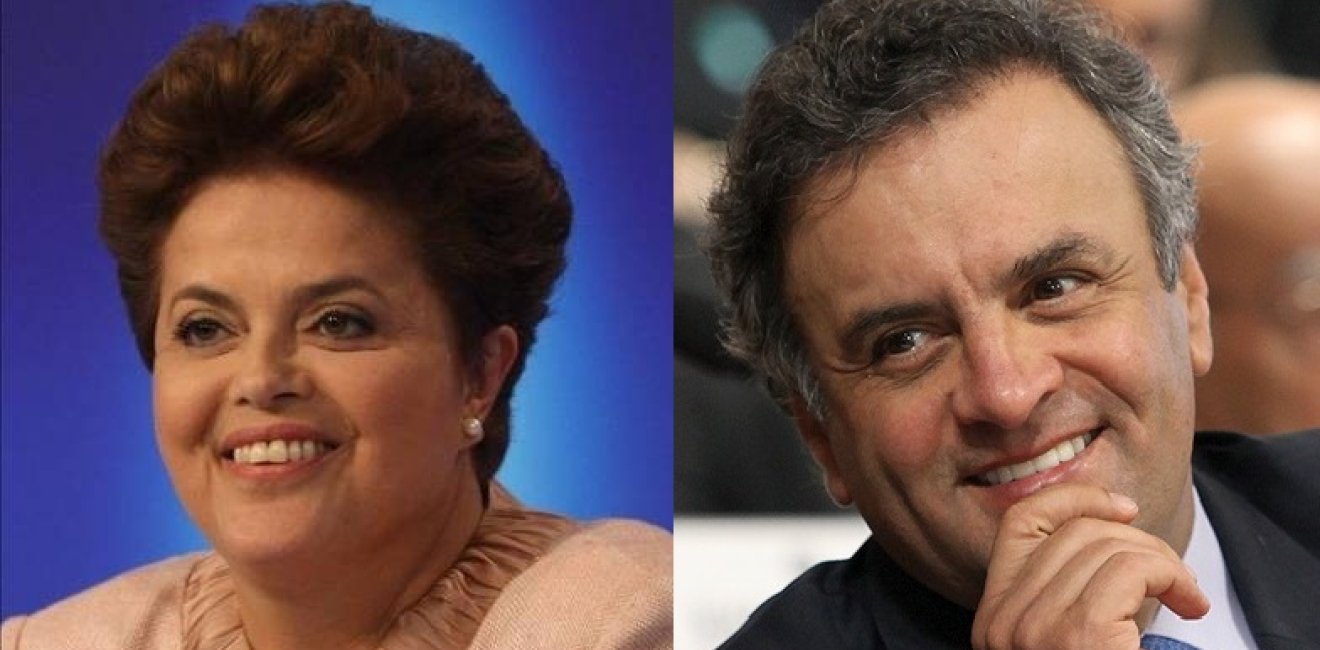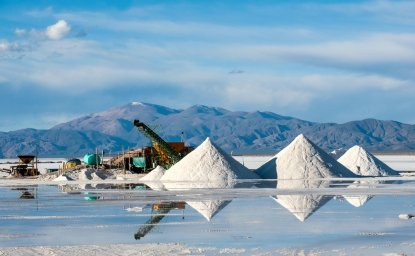President Dilma Rousseff failed to secure an absolute majority of votes in the first ballot of Brazil’s elections and will face senator Aécio Neves, a popular former governor of the state of Minas Gerais, in a final round scheduled for Sunday October 26. Rousseff received 41.5 percent of the record 112 million votes cast, a weaker performance compared to the votes she and her predecessor President Luiz Inacio Lula da Silva received in the first round of the previous three presidential elections won by the Workers Party (PT). Neves, of the Social Democratic Party (PSDB) of former president Fernando Henrique Cardoso, surged in the final week of the campaign to obtain 33.5 percent of the votes and emerged as a strong challenger to Rousseff. "The first round results are very bad for Dilma Rousseff," wrote José Roberto de Toledo, executive editor of Estadão Dados and a respected elections analyst.
Former senator Marina Silva, an environmentalist who led for a while in opinion polls, finished a distant third with 21.3 percent, but may be the deciding voice in the race’s outcome. Speaking to supporters Sunday evening, Marina, who remained neutral in 2010 when she ran for the Green Party and also came in third, indicated she will endorse Neves’ candidacy. "Brazil has signaled since 2010 it clearly disagrees with what we have," she said, referring to the rule of the Workers’ Party, which was her political home for more than a quarter century. Although she did not succeed in her effort to promote a "new politics" and break the polarization PT-PSDB that has prevailed in Brazilian presidential races in the past two decades, Marina could emerge as the king maker if she formally supports and campaigns for Neves. A Datafolha study published days before the first round of votes suggested that 60 percent of her supporters would join the PSDB candidate in the final round.
Rousseff won in 15 of Brazil’s 27 states, including in Neves’ Minas Gerais, by a narrow margin. Analysts attributed this result, however, more to the popularity of the Workers’ Party candidate for state governor, Fernando Pimentel, a former mayor of the capital city of Belo Horizonte, than to Rousseff’s performance. In September, Pimentel’s campaign removed the president’s picture from his ads, fearing the association with Rousseff would reduce his favoritism. The PSDB gubernatorial candidate , João Pimenta da Veiga, a dull politician, did not generate much enthusiasm among voters. In contrast, Neves’ campaign manager, former two-term governor Antonio Anastasia, was easily elected to the Senate, beating Josué Alencar , by a two to one margin. A close ally of Rousseff, Alencar is the son of José Alencar, the late vice president in the government of Luiz Inácio Lula da Silva.
Neves prevailed in 12 states, including the most populous – São Paulo – where two former PSDB presidential candidates won decisive victories. Governor Geraldo Alckmin was reelected by a comfortable margin and former governor José Serra beat PT senator Eduardo Suplicy. Lula’s handpicked candidate for governor, former minister of Health Alexandre Padilha, received less than 20 percent of the votes. The PT did worse than expected in gubernatorial races. It lost 18 of the 88 seats it had in Chamber of Deputies. Its principal ally, the PMDB, lost 7 of its 72 seats. Underlining the popular desire for change expressed in opinion polls since the massive street protests of June 2013, the coalition of parties that support the Rousseff government in the Chamber of Deputies lost a total of 38 seats and was reduced to 302, below the two thirds majority of 308 necessary to approve constitutional changes.
The Workers’ Party has a superior national electoral machine compared to the PSDB and is expected to pull all stops to ensure Rousseff’s reelection. In a subdued victory speech Sunday evening, she hinted at the tone and content of the campaign saying that "the people have rejected ghosts of the past." Political analysts took the statement as confirmation that Rousseff will frame the second round campaign as a comparison between the governments of Cardoso and Lula. It was seen also as a veiled threat to resort to revelations of personal aspects of Neves past life as a young politician. Sources close to the senator signaled he is ready to respond. Following the highly negative - and effective - campaign Rousseff ran against Marina Silva, most observers expect the second round battle to be the nastiest in Brazilian elections history.
President Rousseff will not have advantages she enjoyed in the first campaign round, such as a divided opposition and more time on radio and television than her challengers. Rousseff and Neves will have equal time - two chunks of 10 minutes each, twice a day, on radio and television, to present their cases to the people. Neves is an able politician and a good debater, qualities not associated with the technocrat and uncharismatic Rousseff. They will face off in four nationally televised debates from October 14th to the 24th. Some twenty opinion polls are expected to be released.
To complicate things for the president, Brazil’s economic picture makes it more difficult for an incumbent to run for reelection this year. When Rousseff won the presidency in 2010, running on Lula’s immense popularity, Brazil’s GDP was expanding a record 7.5 percent per year. After four years of anemic growth, the economy is now on the verge of a recession, with low unemployment as the only bright spot in an otherwise negative outlook.
A major corruption scandal involving state oil company Petrobras has become a source of apprehension of PT campaign operatives. As Minister of Energy and Mines and Chief of Staff during the Lula administration, Rousseff was Petrobras’ chair of the board. The allegations, made by a former executive director of the company, involve the laundering of billions of dollars. Rousseff, who is famous for her reputation as a micromanager, said in a television interview she did not have “the slightest idea” of the case. Two of the principal suspects have made plea bargain agreements with federal prosecutors. According to energy sector executives, the scandal could result in the indictment of hundreds of people. It is a much bigger case of corruption than the so-called “Mensalão” case, a congressional vote buying scheme that almost cost Lula his presidency when it was revealed in 2005. It ended two years ago with 25 guilty verdicts and sentencing to jail terms of two politicians and business executives, including the former president’s Chief of Staff, a president of the PT, the party’s treasurer and a former Speaker of the Chamber of Deputies. Regardless of the outcome of the elections, the scandal, known as “Petrolão,” is bound to plague the next administration at a challenging time for the Brazilian economy.
An election full of excitement and surprising turns, the race is likely to remain as difficult to predict as it was when it started last July.
Paulo Sotero is the Director of the Brazil Institute.
*Photo courtesy of Flickr users PSDB MG and Joao de Bourbon.






